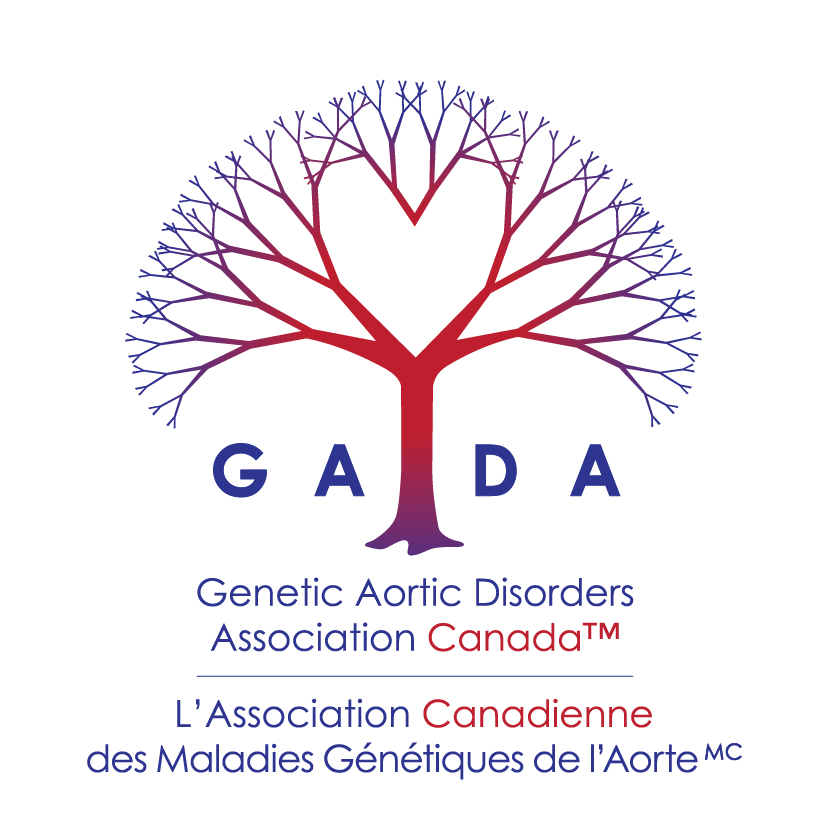On September 17th, in honour of Aortic Dissection Awareness Week, GADA hosted patients, families, caregivers, and healthcare professionals to a special webinar titled ‘Aortic Dissection Awareness: Understand the Signs, Risks, Care and Management Practices’ led by the following experts in the field of aortopathy:
Dr. Gnalini Sathananthan, Cardiologist
Dr. Julie Richer, Medical Geneticist
Gretchen MacCarrick, Genetic Counsellor
Dr. Siddharth Prakash, Cardiologist
The webinar discussed topics such as signs and symptoms of aortic dissection, lifestyle and medication management, genetic testing, gene-specific care, and mental health support and resources.
This webinar was moderated by Science Director of GADA Canada, Andrea Rideout, MS, CCGC, CGC.
Missed the live session? No problem - this webinar is available to watch on GADA’s Youtube channel.
ABOUT THE SPEAKERS:
Gnalini Santhananthan - Dr. Gnalini Sathananthan (BSc (Med) MBBS, FRACP, MPhil) is a cardiologist based at St Paul’s Hospital in Vancouver, Canada. She is an echocardiographer, adult congenital heart disease specialist and the medical lead of the provincial Heritable Aortopathy Program in British Columbia. She is a member of the Montalcino Aortic Consortium (MAC) and has a strong interest in increasing awareness and improving outcomes for patients with heritable aortopathy.
Julie Richer – Dr. Richer is a medical geneticist at CHEO and an associate professor at the University of Ottawa. Her clinical practice primarily consists of the care of patients with underlying connective tissue disorders such as familial thoracic aneurysms, and cardiogenetic disorders. In 2012, she founded a heritable connective tissue/arteriopathy clinic which bridges the adult and pediatric worlds. Dr. Richer's spearheaded and chairs the Virtual Trans-Canada Aortopathy Rounds – a virtual educational session for geneticists, genetic counsellors, cardiologists, and other medical professionals, these rounds take place at least 6 times per year since the fall of 2021. In May 2022, Dr. Richer became the lead for the Cardiogenetics Expert Group for the Provincial Genetic Program. She is a member of the international ClinGen HTAAD gene curation expert panel and of MAC. She has previously served on the Canadian Medical Association Ethics Committee. She chaired the Ethics, Education and Public Policy committee of the Canadian College of Medical Genetics and served as the vice-chair of the specialty committee for Medical Genetics for the Royal College of Physicians and Surgeons of Canada. Dr. Richer completed medical school at L'Université de Montreal, FRCPC in medical genetics at the University of Manitoba and a fellowship in medical ethics at Harvard University.
Gretchen MacCarrick – Gretchen MacCarrick is an Assistant Professor in the McKusick-Nathans Department of Genetic Medicine at the Johns Hopkins University where she is Co-Director of the Cardiovascular connective tissue disease clinic. She has extensive experience with mental health and other support topics for the aortic disease population through her involvement in an advisory capacity for the Marfan and Loeys-Dietz Syndrome Foundations.
Siddharth Prakash - Siddharth Prakash has a Ph.D. in Molecular and Human Genetics from Baylor College of Medicine, where he also completed his residency in Internal Medicine and a fellowship in Cardiovascular Disease. He is board certified in cardiology, echocardiography, and adult congenital heart disease. Since 2011, Dr. Prakash has worked as the cardiologist in the Multidisciplinary Aortic and Vascular Disease Clinic at McGovern Medical School, a part of the University of Texas Health Science Center at Houston, where he specializes in medical therapy, imaging, and surveillance of patients with heritable aortic and vascular diseases. He is Professor of Internal Medicine and is co-director of the Turner Syndrome Adult Comprehensive Care Center, a multispecialty clinic that sees Turner syndrome patients from across the southwest region. He leads the national Turner Syndrome Research Registry and is chair of the Scientific Advisory Board of the Turner Syndrome Society of the United States. He also co-chairs the Collaborative Clinical Science working group of the GenTAC Alliance and is an investigator with the Montalcino Aortic Consortium. Dr. Prakash’s translational research focuses on the contribution of rare genetic variants to bicuspid aortic valve (BAV), the most common adult congenital heart defect. Dr. Prakash uses an innovative strategy to identify new candidate genes for BAV, based in part on the hypothesis that reduced dosage of genes on the X chromosome is responsible for sex differences in the prevalence of BAV and other congenital heart diseases. His team demonstrated that specific rare genetic variants predict complications of patients with BAV. Dr. Prakash has received funding from the National Science Foundation, American Heart Association, National Institutes of Health, and the John Ritter Foundation for Aortic Health, which funded the first clinical trial of exercise in aortic dissection survivors led by Dr. Prakash.
EVENT DISCLAIMER: The contents of this GADA Canada hosted virtual event, such as presentations, discussions, text, graphics, images, and other materials created or presented by GADA Canada and by others appearing in the event at the invitation of GADA Canada are for educational and informational purposes only. GADA Canada is a voluntary health organization and is not engaged in rendering medical advice or recommendations on diagnosis or treatment of genetic aortic disorders. The content within this virtual event or the GADA website, www.gadacanada.ca, should not replace necessary consultations with qualified health care professionals for medical advice, diagnosis, or treatment.
Genetic aortic disorders are complex, multi-system disorders that can only be properly diagnosed and managed by skilled and trained health care professionals. The manifestations and severity of these disorders vary greatly among individuals and require personalized medical management. None of the medications, courses of treatment or lifestyle & activity recommendations discussed in this virtual event should be undertaken without being discussed with your physician.

